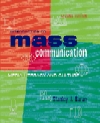Stanley J. Baran
| Acta Diurna | written on a tablet, account of the deliberations of the Roman senate; an early "newspaper"
|
 |
 |
 |
| agenda setting | theory that argues that media may not tell us what to think but that media tell us what to think about
|
 |
 |
 |
| Alien and Sedition Acts | series of four laws passed by 1798 U.S. Congress making illegal the writing, publishing, or printing of ìany false scandalous and malicious writingî about the president, the congress, or the U.S. government
|
 |
 |
 |
| Bill of Rights | the first 10 amendments to the U.S. Constitution
|
 |
 |
 |
| broadsides (sometimes broadsheets) | early colonial newspapers imported from England, single-sheet announcements or accounts of events
|
 |
 |
 |
| civic journalism | modern practice of newspapers actively engaging the community in their reporting of important civic issues
|
 |
 |
 |
| community publishing | the practice of local newspapers to link from their online sites to pages built by local schools, clubs, etc.
|
 |
 |
 |
| corantos | one-page news sheets on specific events, printed in English but published in Holland and imported into England by British booksellers; an early ìn ewspapers
|
 |
 |
 |
| desktop publishing | small-scale print content design, layout, and production made possible by inexpensive computer hardware and software
|
 |
 |
 |
| diurnals | daily accounts of local news printed in 1620s England; forerunners of our daily newspaper
|
 |
 |
 |
| feature syndicates | clearinghouses for the work of columnists, cartoonists, and other creative individuals, providing their work to newspapers and other media outlets
|
 |
 |
 |
| First Amendment | Congress shall make no law respecting an establishment of religion, or prohibiting the free exercise thereof; or abridging the freedom of speech, or of the press; or the right of the people peacefully to assemble, and to petition the Government for a redress of grievances
|
 |
 |
 |
| hard news | news characterized by factual accounting, data, and information
|
 |
 |
 |
| joint operating agreement (JOA) | permitted when a failing paper is allowed to merge most aspects of its business with a successful local competitor, as long as editorial and reporting operations remain separate
|
 |
 |
 |
| newspaper chains | businesses that own two or more newspapers
|
 |
 |
 |
| pass-along readership | measurement of publication readers who neither subscribe nor buy single copies but who borrow a copy or read one in a doctorís office or library
|
 |
 |
 |
| penny press | newspapers in the 1930s selling for one penny
|
 |
 |
 |
| public journalism | see civic journalism
|
 |
 |
 |
| soft news | news characterized by opinion, background, and ìcolorî
|
 |
 |
 |
| wire services | news-gathering organizations that provide content to members
|
 |
 |
 |
| yellow journalism | early 20th-century journalism emphasizing sensational sex, crime, and disaster news
|
 |
 |
 |
| zoned editions | suburban or regional versions of metropolitan newspapers
|



 2002 McGraw-Hill Higher Education
2002 McGraw-Hill Higher Education

 2002 McGraw-Hill Higher Education
2002 McGraw-Hill Higher Education